

Your Future Career




Building from within: how internal development drives retention
At the beginning of each year, we celebrate organisations that lead the way in building high-trust, high-performance cultures — an annual recognition known as the Best Workplaces™ in Ireland.

The top organisations, spanning all sectors, industries and sizes, understand that sustaining performance means investing in people at every stage of their careers. Our 2025 Employee Experience Report, capturing the voices of nearly 60,000 people across Ireland, revealed that 81% of employees at this year’s Best Workplaces™ agree with the statement: “I want to work here for a long time.” Nationally, that figure drops to just 59%. This gap reflects more than job satisfaction — it highlights how well organisations support employees through natural career transitions and lifecycles.
Retention starts with career visibility From the outset, employees who see clear development opportunities are more likely to stay. Feeling valued and empowered, they grow with the organisation — strengthening trust and creating a strong foundation for a high-performance culture. Over time, the benefits compound: organisations build internal pipelines, reduce hiring costs and adapt more quickly by moving talent across roles.
Career transitions — whether stepping into leadership or returning after leave — are defining moments in anyone’s career journey. At Ireland’s Best Workplaces™, 82% say they’re offered meaningful development opportunities, compared to just 59% nationally. These include leadership training, mentoring, job shadowing and tailored upskilling — programmes designed to equip employees for success at every stage of their journey.
Internal mobility key for success Career development is also essential for long-term agility and retention. As technology reshapes industries and skills needs evolve, internal mobility has become a competitive advantage. Organisations that grow talent from within are better positioned to close skills gaps, adapt to market shifts and innovate from the inside out — all while retaining valuable employees.
Leadership’s part to play Leadership plays a critical role. Nationally, only 52% of employees say their manager shows a sincere interest in them — at Ireland’s Best Workplaces™, it’s 82%. When managers prioritise career conversations and support stretch opportunities, they send a clear signal that growth matters. At the same time, HR must design integrated strategies that blend learning, coaching, mentoring and digital tools into meaningful career journeys that support retention. Ultimately, career development is more than a retention tool — it’s a strategic investment in longterm organisational success. We’ve seen it firsthand: businesses that nurture talent from the inside will outperform, outlast and out-innovate the rest.
Graduate employment remains strong despite headwinds

The graduate recruitment sector remains robust in both the public and private sector despite a volatile global market and the uncertainty surrounding the impact of AI.
The graduate recruitment landscape has remained remarkably resilient for the past decade. At gradireland, we have seen this in the strength of our employer partnerships and resilience of student engagement, reflected in consistently high attendance at our careers events.
Graduate careers market trends Many employers are integrating AI-driven processes into their recruitment and selection tools. The technology itself has impacted the jobs market, primarily toward the younger end of that market, which is where graduate jobs are. Increasingly, AI is becoming part of graduate roles, rather than completely replacing them, and the hiring trends among major graduate recruiters remain positive.
employment rate for those aged 15–64 in Q1 2025, with 2.8 million employed. Full-time positions account for 79% of these, with notable growth in technology and education.
Global uncertainty makes its presence felt, but graduate programmes in both the private and public sectors remain highly competitive. Those most invested in technological investment, such as the professional services firms known as the ‘Big 4’ (Pwc, EY, KPMG and Deloitte) and public sector organisations such as Dept of Education and the Central Bank, actively recruit large numbers of graduates, offering structured mentorship, training and career progression pathways. Salaries for graduate positions in these companies remain highly competitive, often in the region of €30,000–€40,000.
Well-developed graduate recruitment Ireland’s robust graduate recruitment landscape reflects a generally vibrant jobs market and a strong economy. While events beyond the control of graduate recruitment can affect what the future brings, the well-developed fundamentals of graduate recruitment are strong. Companies know the positive impact of the graduate workforce, so there is still every reason, despite reasonable caution, to be optimistic about the future.
Robust jobs market in Ireland Ireland boasts an exceptionally high employment rate for recent graduates. According to Central Statistics Office (CSO) data, over 90% of tertiary graduates find employment within nine months of graduation — well above the EU average. CSO also points to a 75%
Gavan O’Brien Managing Director, gradireland
Jim Flynn CEO, Great Place to Work Ireland
The work they do is real and meaningful. It makes a difference and contributes to the bottom line.
Why graduates get a career-enhancing boost from on-the-job training
A global company’s graduate programme gives successful candidates the chance to sample roles in different teams, accelerating their learning and widening their experience.
Sponsored by PepsiCo

When Kate Murphy applied for a place on PepsiCo’s graduate programme, she already knew what it was like to work for the company. “I’d been an IT delivery and development intern there in 2022 as part of my degree course,” she explains. “As soon as I started, I just knew I was going to stay.”
Graduate pathways in action
That’s exactly how it worked out. Murphy finished her degree in Business Information Systems at University College Cork and joined the company as an IT graduate in 2023. Since then, she has relished the chance to sample life in different IT teams, supported by on-the-job training and mentorship. “IT is such a broad subject,” she says. “So, learning about different roles has been really satisfying.”
An average of 20 graduates join the companywide programme each year (around 80% are former interns) across finance, supply chain, engineering, procurement, quality, health and safety, HR, R&D and IT. They spend two years in their chosen function, are assigned a manager and a mentor and usually work in at least three different roles — although finance graduates spend three years on the programme to complete their relevant accountancy qualifications.
Making a difference and contributing to the bottom line
The rotational nature of the programme is a big reason for its success, explains Sinead O’Dwyer, Global Talent Acquisition Lead, Early TalentEurope. “Rotating roles within their function helps graduates gain diverse experience and accelerates their learning,” she says. “The work they do is real and meaningful. It makes a difference and contributes to the bottom line.”
David Hennessy, Customer Engagement and Logistics Senior Manager, agrees. He started in the company as a graduate in 2010 and knows how career-enhancing diverse experiences can be. “I’m an engineer by trade, but I’ve worked in

operations, productivity, data analytics and am now onto my third role within supply chain,” he says. “It’s an environment where you’re encouraged to explore opportunities.”
Hennessy is also an Early Talent Sponsor with a remit to support the programme’s supply chain graduates. “It gives them a real footing in the business,” he says. “But it’s not a one-way street. From our side, grads bring a fresh perspective, so it’s brilliant to see them come in, challenge the status quo and acquire a lot of new skills. They start to add value within the first month.”
Investing in high-calibre and talented individuals That said, after the two years are up, a full-time job is not guaranteed. “One of my roles as a sponsor is to make sure grads are hot property by the time their programme ends,” says Hennessy. “When we’ve been investing effort into fantastic, highcalibre people, we want to find a place for their talents.”
The company continues to look for ways to develop its skills training. From September, graduates will also be able to participate in a formalised 12-month training programme, run in partnership with IBEC and accredited with TU Dublin.
Building hands-on local and global skills
For Kate, things are changing. Her time on the graduate programme is now coming to an end — although she has applied for a permanent IT role. “I’ve really enjoyed the last two years,” she says. “I delivered training for colleagues outside IT. I worked on a big project that ended up being adopted by the IT department. I also helped manage an IT execution system for the manufacturing floor and got to travel to the US and Uruguay for a project’s go-live and hypercare phases. It’s great to know that the work I’ve done has been useful, valued and will stand me in good stead for the future.”
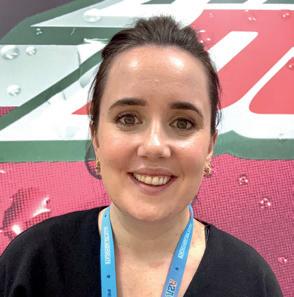


Sinead O’Dwyer Global Talent Acquisition Lead, Early Talent - Europe, PepsiCo
David Hennessy Customer Engagement and Logistics Senior Manager, Early Talent Sponsor, PepsiCo
Kate Murphy IT Graduate, PepsiCo
WRITTEN BY Tony Greenway
The professional services firm that’s investing big in people development and AI
At Deloitte, our people are our greatest differentiator. Individually impressive and collectively inspirational, their ideas ignite positive change for our clients, our team and society.

By collaborating on client challenges, we innovate, push boundaries and reimagine possibilities — ensuring that no two days are ever the same.
Committed to careers powered by learning Our commitment to Deloitte Works — our hybrid policy — remains a compelling aspect of our culture, setting us apart from the industry. Our substantial investment in learning propels Deloitte’s growth, particularly in AI, creating unparalleled career opportunities for all our people, from those just starting their careers to seasoned professionals.
We are proud to be the #1 Global Professional Services Firm. Top talent wants to be a part of that success and recognition, knowing that at Deloitte, our people are not just part of the team; they are the driving force behind our progress and achievements.
How is Deloitte harnessing AI innovation to benefit both talent and clients?
AI is transforming how we solve problems, and Deloitte is all in. Our dedication to innovation is demonstrated through AI-powered insights for clients and a comprehensive strategy to equip our people with cutting-edge skills.
For our people, we offer initiatives like our AI Learning Hub with curated content to keep our team ahead in AI advancements. Our talent programmes, including the NextGen Tech Academy and Future Leaders Academy, provide rigorous upskilling and real-world experience with advanced technologies.
At the heart of our organisation lies an unwavering curiosity—a catalyst for transformation. By forging strong partnerships with our clients, we gain deep insights into their unique business challenges.
How has Deloitte used technology to drive meaningful impact?
One standout project involved deploying AI to enhance risk management and customer insight for a leading financial services client, compressing what used to take weeks into mere hours while unlocking insights and business opportunities at speed. Beyond the numbers, this effort empowers our teams to hone their digital and analytics capabilities, reinforcing that technology at Deloitte isn’t theoretical; it’s transformational.

What advantages do you offer to thrive in an AI-driven environment?
For those eager to pursue a career in an AI-driven environment, Deloitte provides exceptional opportunities. New hires join dynamic teams such as ‘Analytics and Cognitive’ and ‘AI & Data,’ engaging in transformative client projects.
You’ll work with cutting-edge open-source technologies in data strategy, business intelligence, artificial intelligence (including generative AI) and cloud. Be mentored by seasoned leaders and have access to a robust AI and genAI learning curriculum, accelerating your expertise and leadership.
For employees, we offer a world-class learning and development experience through our AI and generative AI curriculum, offering a comprehensive and personalised AI learning journey, from the fundamentals of trustworthy AI through to advanced, specialist certifications.
Our employee AI Hub is coupled with collaborative live opportunities, workshops and hackathons, allowing our people to learn from and challenge each other. We’ve also established a GenAI Learning Forum — a network of champions who ensure that tailored, up-to-date AI learning is a priority for all teams.
How does Deloitte deliver impact for clients?

As the #1 professional services firm globally, clients seek Deloitte for our depth of capabilities and commitment to value realisation. Our proprietary assets, such as digital audit platform, Omnia, allow us to accelerate engagements and co-create custom solutions that directly address our clients’ unique challenges.
Our multidisciplinary approach combines human insight with AI-powered efficiency to drive meaningful transformation. To succeed in this age of technological advancement, organisations must empower their workforce to adapt, and we stand alongside them as a trusted partner in driving that change.
Finally, what kind of people thrive at Deloitte? Curiosity, adaptability and purpose-driven ambition are what define success here. Those who thrive are open, collaborative and bold. We value people who bring fresh perspectives, challenge norms and have compassion for each other. The pace of change is unprecedented, and it demands a workforce that is not only resilient but also innovative.
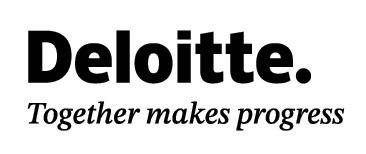
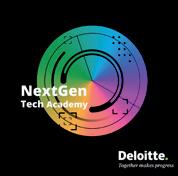
Spread sponsored by Deloitte
Sinead Gogan Partner & Head of People and Purpose, Deloitte Ireland
Find out more at
deloitte.ie
Scan for more on careers at Deloitte.

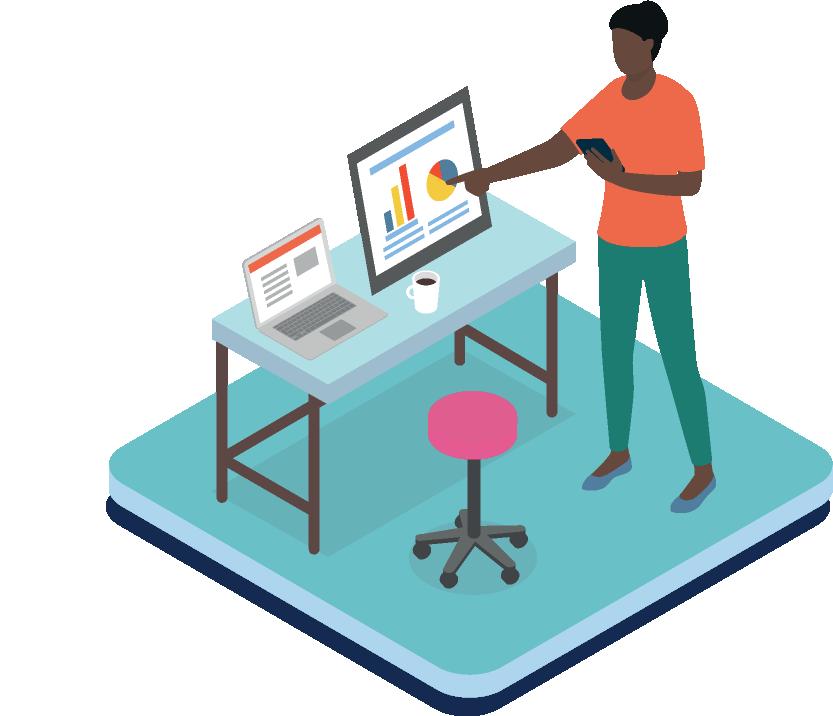
How NextGen Academy is helping launch careers in tech
Fennessy, Solutions Developer at Deloitte Ireland, joined via the 2022 NextGen Tech Academy. She develops cloud-based client solutions, thriving in a fast-paced, collaborative and inclusive environment.
What did you study in college, and how did that lead to your passion for technology?

The fast-paced, varied work keeps me learning and growing.
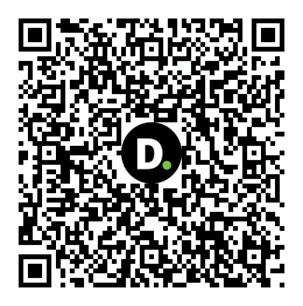
I do not come from a typical tech academic background; I studied English Literature and Italian at Trinity College Dublin. I always liked analytical subjects in school. In my final year of university, I took a module that focused on using natural language processing (NLP) — a cornerstone of generative AI models like ChatGPT — to analyse large corpora of text. I loved this module and the way it blended abstract questions and critical thinking with analytical and data-driven arguments. From that point onwards, I became interested in emergent technology and its novel applications in solving modern problems.
What was it about Deloitte and the NextGen Tech Academy that first caught your attention?
I love to learn, so when I saw that Deloitte Ireland’s NextGen Tech Academy included a period of paid immersive learning, I jumped at it. It was also open to people who were interested in technology but had no prior experience or education in tech. Overall, it was exactly what I was looking for. I wanted a challenge, and a career in consultancy appealed to me because of how varied the work and clients can be.
What new skills did you learn during your time in the NextGen Tech academy?
I really had no applied knowledge about technology going into the NextGen Tech Academy. It was a completely clean slate for me. I learned everything from how to code my own basic app to complex cloud deployments. The training is quite intensive, but the instructors were very supportive, and there was a strong spirit of helping one another out among the learners.
Can you share a favourite moment or project from your time in the programme?
Our final project involved deploying an
application and connected database in the cloud, complete with a CI/CD (continuous integration and continuous development) pipeline, allowing for near-automatic updates to be made to the application. It was a group project that was very challenging and required a high degree of teamwork.
We presented our projects to engineering leadership at Deloitte, answering their questions in relation to our code or process. It was a highlight, and I was surprised by how many questions I could answer. I realised I had learned so much so quickly.
What do you enjoy most about your current role? What I enjoy is solving complex technical problems that drive real client value. The fast-paced, varied work keeps me learning and growing. I also appreciate working with my skilled, inclusive team whose diverse technical experience always helps us find the best outcomes that meet client needs and support their goals.
How did the academy specifically prepare you for the challenges of this position?
The academy gave me the technical literacy and skills I needed to excel in my role. It also gave me confidence in my ability to translate business needs and insights into technological solutions and vice versa.
In what ways has Deloitte continued to support your personal and professional growth?
Deloitte is a great place to begin your career; you get exposure to many different industries and work alongside very experienced and driven colleagues who support you every step of the way. There are also many support networks and social activities that help you build a community while at work.
Ciara
Ciara Fennessy Solutions Developer, Deloitte Ireland
Take the leap and apply to NextGen Tech Academy 2025 today.
Opening pathways for engineers of the future
Structured graduate, internship and apprenticeship programmes play a vital role in preparing Ireland’s next generation of engineers by providing multiple routes into the profession.
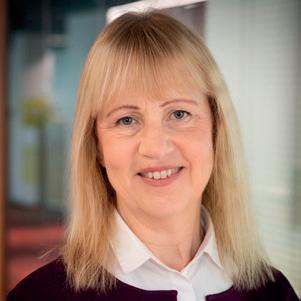
Apprenticeships combine hands-on training with mentorship, helping students from all backgrounds to build technical skills and career confidence. These initiatives allow students to develop industry-relevant skills, gain exposure to major projects and learn directly from experienced professionals, directly strengthening performance and fuelling company growth.
Engineering across continents Engineering firm Jones Engineering offers significant international opportunities across its operations in Europe, the Nordics and the Middle East. Irish engineers have thrived overseas, gaining experience on world-class projects in sectors ranging from life sciences and hi-tech to renewable energy. Many return to Ireland with enhanced skills and leadership capabilities, with many building long-term global careers within the organisation. This blend of domestic and international experience ensures that early career professionals are equipped to succeed in an increasingly global industry.
Building a more inclusive industry

The engineering and construction industries are undergoing a transformation. Increasing participation from underrepresented groups, strengthening apprenticeship pathways and empowering women in STEM are no longer optional initiatives. They are central to the future of our industry. At Jones Engineering, we are committed to nurturing the next generation through graduate and apprenticeship programmes that provide young
Ways to engineer a world of opportunity
professionals with a foundation for lifelong careers, while our diversity efforts bring fresh perspectives that strengthen the industry as a whole. Encouraging more women and young people into engineering is about innovation and building an industry that reflects the society it serves. National initiatives such as TrailblazHER and I Wish are helping open doors for female students, offering mentorship, workshops and role models. By actively supporting such programmes, alongside university scholarships through Technological University Dublin, Jones Engineering ensures women can access both education and industry opportunities, while investing in visibility and financial support to address long-standing sector gender imbalances.
Accredited for development
In May, the firm achieved the Investors in Diversity Silver Accreditation from the Irish Centre for Diversity, affirming measurable progress in recruitment, retention and progression. With employees from more than 50 nationalities, inclusivity is embedded in the organisation’s culture.
Furthermore, the company was re-accredited in June by Engineers Ireland as a CPD Accredited Employer, earning Advanced Level status — a prestigious recognition reserved for organisations that demonstrate exceptional alignment between personal development and business strategy. Our approach ensures that every team member is equipped to meet the evolving challenges of a fast-paced global industry. These achievements are proof that creating opportunities for diverse talent leads to stronger, more resilient teams.
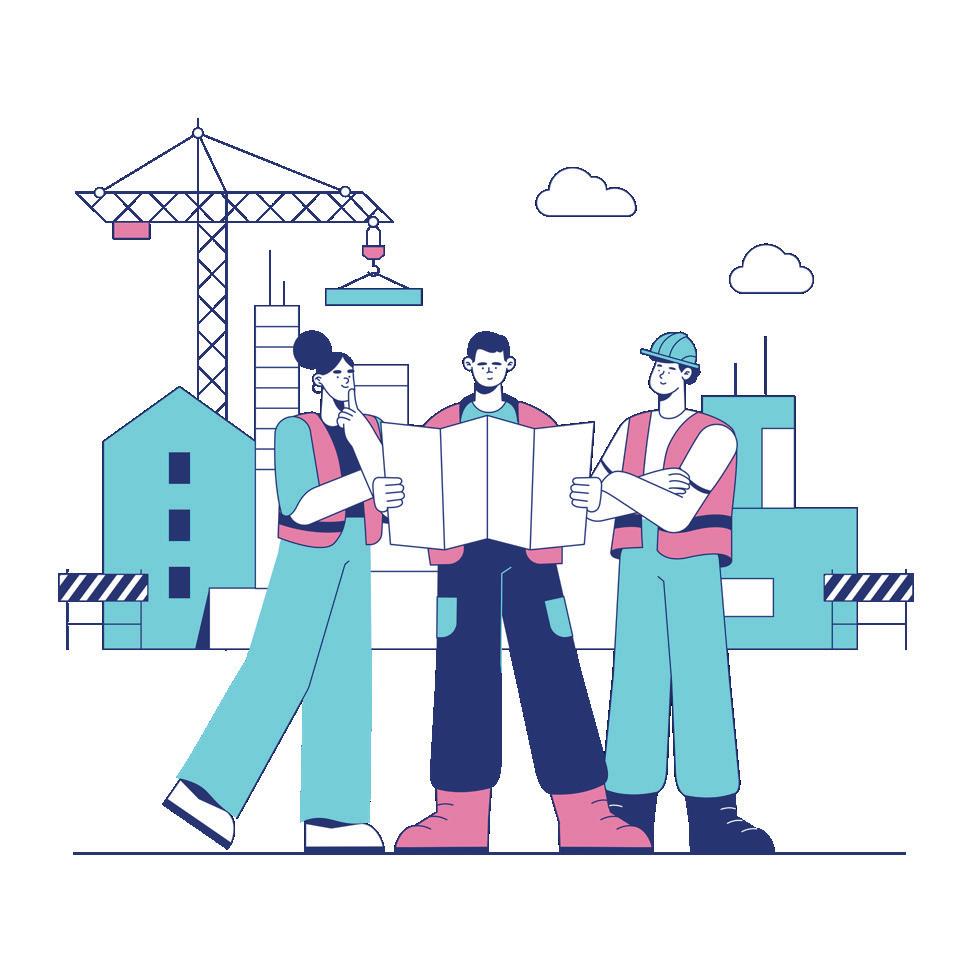

Whether you’re considering your college options or looking at a career change, engineering offers an exciting and impactful career.
University route
A wide range of third-level institutions offer engineering qualifications accredited by Engineers Ireland, including all universities in Ireland. Most of the universities offer programmes with a common first year as well as specialist engineering courses. Students may be awarded a Bachelor of Engineering degree, or a similar qualification, and may progress on to specialise further with a Master’s
degree. Graduates of engineering degrees also frequently pursue nonengineering disciplines, including business and science programmes, where they often excel due to the strong quantitative and problemsolving skills developed through their engineering education.
Apprenticeships earn and learn
An apprenticeship is a programme that combines learning in the workplace with learning in an educational institution or training centre. Academic learning takes place for the full duration of the apprenticeship, usually in blocks on campus, combined with academic modules delivered while the learner is gaining hands-on training in the
workplace. Apprenticeships are also paid employment, allowing the apprentice to ‘earn and learn.’
QQI-FET pathway
Quality and Qualifications Ireland (QQI) Further Education and Training (FET) is a pathway for students to enter accredited degree programmes. Students with the relevant and appropriate QQIFET Level 5/6 major awards and components, with a minimum achievement in the different programme components, may be admitted on a competitive basis to Higher Education Institutions (HEIs). To apply to a HEI via the QQI-FET entry pathway, you must apply to the Central Applications Office (CAO).
Importance of accredited programmes
If you intend to study engineering, prioritise a route into an Engineers Ireland-accredited programme. Engineers Ireland accreditation is an independent brand of quality and involves detailed reviews of engineering programmes by educational and industry peers. Through alignment with the Washington, Sydney, Dublin, and Seoul Accords, engineering graduates with technician, technologist and bachelor’s qualifications from Engineers Ireland-accredited programmes can work in countries across the world.
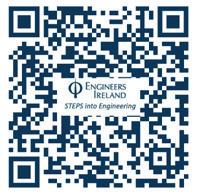
Carmel Walsh Chief People Officer, Jones Engineering
Keith Sunderland Registrar, Engineers Ireland
Explore the many ways to pursue a career in engineering, whether it’s an apprenticeship, training or a university course.
Sponsored by Jones Engineering
Driving professional bus driver careers forward with opportunities at Dublin Bus
As Ireland’s largest public transport provider, Dublin Bus is an inclusive employer with a diverse team of over 4,400 employees from over 89 different countries of origin.
Areliable, modern public transport system depends on the people who operate it. Professional bus drivers are not just essential for keeping Dublin Bus services running day to day; they are the backbone of the State’s most ambitious public transport investments. Without them, flagship projects like the BusConnects programme and the electrification of the public transport fleet cannot be delivered on time or to the standard the public expects and deserves.
The professional bus driver
The role of the professional driver is to deliver passengers to their destinations safely, on time and in a courteous manner. Dublin Bus offers full and part-time professional bus driver positions. Training for
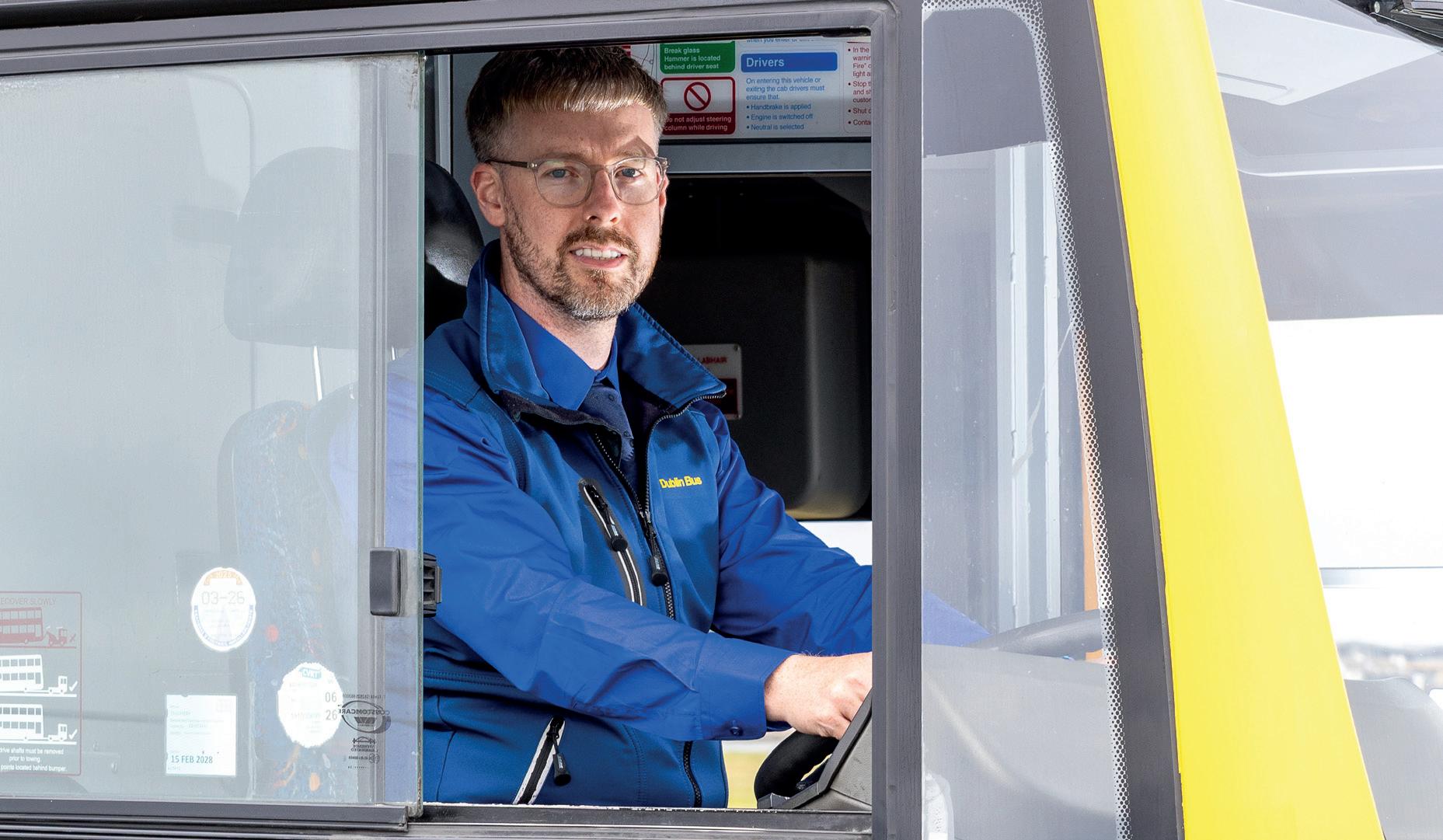
new drivers takes four weeks for bus licence applicants and six weeks for car licence applicants.
or chief inspectors. Many drivers also find rewarding career paths in administration and management roles.
Continuous development through the Education Support Scheme
As part of our broader commitment to learning and development, Dublin Bus provides support through an Education Support Scheme. This scheme is available for appointed employees to undertake a course of study leading to professional, academic and vocational qualifications.
Bus driver David Smith shares: “I traded in my wings to join Dublin Bus as a professional bus driver in 2022. As a former airline captain, some people wondered why I’d make the switch. My reply was: Why not?
For me, it was a chance to bring my skills in safety and teamwork to a new job with new challenges. I’m now enjoying the rewards of a different kind of journey — one that’s all about getting people safely where they need to go and connecting with my passengers along the way.
“My colleagues are amazing, and we’ve had some epic adventures together. The Education Support Scheme has been a game-changer for me, allowing me to upskill and take my career to the next level.”
Grow while training others
Tina Ahearn, Chief Inspector, says:
“I started working in Dublin Bus in 1999 as a bus driver. I became a fully qualified ADI in 2021, working in the Training Centre, teaching new employees how to drive a bus. I was promoted to a Chief Inspector position recently. I honestly feel very privileged to have achieved all of this while working for a company that I love.”
Invest in personal development
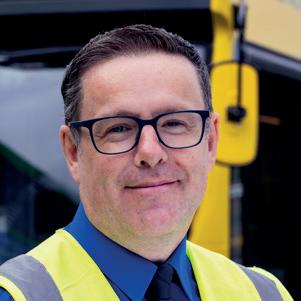
There are numerous career paths and growth opportunities available to professional bus drivers.
Ongoing training and development, including a periodic Certificate of Professional Competence (CPC), is provided to all bus drivers during their career. The standard of training at the Dublin Bus Training Centre is one of the highest in Europe, with training carried out by driver trainers who are Approved Driving Instructor (ADI) qualified. A driver mentoring programme is in place for new drivers for their first 12 months.
Progression for a professional bus driver There are numerous career paths and growth opportunities available to professional bus drivers in Dublin Bus. Promotions are advertised, and drivers can apply to become driver mentors, part-time driver trainers, tour bus drivers, inspectors
Jonathan Lynam, Area Operations Manager, Clontarf Depot, adds: “I come from an electrical background and ran my own electrical business for three years. The long-term uncertainty within the industry prompted me to look for career stability and opportunity elsewhere. Dublin Bus has provided me with career opportunities and personal development.
“I’ve always been interested in further education, and I have now completed a degree through the Education Support Scheme in Dublin Bus. I would recommend the scheme to any employee eager to further their personal development. Open doors for yourself and go for it.”


David Smith Bus Driver, Dublin Bus
To find out more scan the QR code
Sponsored by Dublin Bus
Tina Ahearn Chief Inspector, Dublin Bus
Jonathan Lynam Area Operations Manager, Clontarf Depot, Dublin Bus
Image provided by Dublin Bus.

By providing these degrees locally, this initiative not only widens access to education but also ensures graduates are more likely to choose to work in their local communities.
Tertiary degrees are broadening access to nursing and social care in Atlantic and Border region
Atlantic and Border Alliance’s new tertiary degrees open inclusive pathways into nursing and social care degrees — offering local study, supportive entry and opportunities to meet regional workforce needs.

Mary Lynch McKenna
FET Strategic Lead, Tertiary Manager, Cavan and Monaghan ETB, Atlantic and Border Tertiary Strategic Alliance

Despite leaving school before completing her learning certificate, one woman is about to embark on her dream nursing career, made possible thanks to a pathway between Atlantic Technological University and its regional ETBs; Galway and Roscommon ETB (GRETB), Mayo, Sligo and Leitrim ETB (MSLETB), Donegal ETB, and Cavan and Monaghan ETB (CMETB).
Supportive access to nursing
“I thought there was never a chance for me to go and do my nursing degree,” says Donegal’s Elaine Tinney. “But tertiary programmes open so many doors for you.”
“Our alliance was the first of its kind to provide this kind of tertiary access route to nursing,” explains Claire Fiddaman, Programme Development Coordinator of Tertiary Education, ATU. “Students have the opportunity to bypass the traditional CAO points race for a more gentle, supportive and inclusive university pathway, where successfully completing a QQI Level 5 Nursing Studies Course and meeting set requirements guarantees them
progression to the degree.”
Social care tertiary degrees
The Atlantic and Border Alliance is a strategic collaboration between further education and higher education to meet the demands of the workforce. This innovative partnership has also developed a tertiary Social Care Practice Degree in CMETB, offered at Cavan Institute, ensuring a steady flow of skilled graduates ready to meet the skills needs in the region.
“There is a huge shortage of both nurses and social care workers in this region. By providing these degrees locally, this initiative not only widens access to education but also ensures graduates are more likely to choose to work in their local communities,” says Mary Lynch McKenna, Tertiary Manager at Cavan and Monaghan ETB.
“Because tertiary education is part of the government strategy, it has the support of other agencies like the HSE who provide additional clinical placements so we can provide more opportunities for the region,” explains Fiddaman. “It’s about getting the right kind of people, people who are caring and compassionate, but who may not have had this chance before,
hopefully resulting in a more diversified workforce.”
Whilst the tertiary Social Care Practice degree is not yet CORU approved, an application has been made to CORU; the status of this process will be reflected on both the website and promotional material.
The benefits of studying locally
With many people changing to a career in nursing or social care later in life, the benefits of a tertiary programme are vast, including no college fees and local enrolment in the first year, dual-registration, smaller class sizes and a nurturing, supportive faculty.
“Students get introduced to higher education at a gradual pace, by experiencing HE through taster days, mentoring and access to full university facilities, while attending the FE centre,” explains McKenna.
Fiddaman adds: “Students can begin their degree in their local ETB, with smaller class sizes and dedicated lecturer support. This allows them to balance family commitments and financial considerations, while still progressing to higher education.”

Image provided by National Tertiary Office
Claire Fiddaman
Digital arts tertiary bachelor’s degree provides a confident career transition
The Mid-West Tertiary Strategic Alliance highlight their digital arts tertiary degree, with no college fees in the first year, local enrolment and ability to sample modules from three different degree specialisms with no portfolio requirements.
Expecting students to know exactly what they want to do when they leave school is often unrealistic. Specific tertiary bachelor’s degrees in Tipperary, Limerick and Clare are allowing students to explore their interests with seamless progression to university.
Making an informed choice of degree
“Our digital arts programme offers students a unique opportunity to engage with modules from three different degrees, covering digital animation, game art and design and visual effects,” explains Jenny Whelan, Tertiary Manager at Tipperary ETB. “At the end of year one, students can decide which of the three degree programmes they wish to progress to in year two.”
“This is just one of several programmes designed in this way, offering flexibility and choice, and it is also a unique opportunity to study digital arts without needing a portfolio or Central Application Office (CAO) points, something which is not available through traditional routes,” she continues.
With the added benefits of no college fees and local ETB enrolment with dual-registration, the advantages of tertiary degrees are clear. They combine flexibility, improved access and a supportive transition to a career fit for the student.
New pathway to higher education
This Mid-West Tertiary Strategic Alliance is a collaboration bringing together the knowledge and expertise of the
Technological University of the Shannon, Limerick and Clare ETB and Tipperary ETB with one common goal: to further improve opportunities for local students.
“The CAO route will suit many, but there was a real need for a new pathway,” explains Dr Sarah O’Toole, Tertiary Manager in TUS. “We’re giving students the opportunity to start their degree locally, in smaller classes and with guaranteed progression to university.”
She adds: “We are seeing huge benefits from working together as an alliance, and we are committed to combining our resources to set up new tertiary degree programmes to be co-delivered across multiple locations, to meet the needs of the region.” In September 2025, programmes in areas such as sport, digital arts, business and computing are available.
A supportive learning environment
Tertiary degree programmes are aimed at improving access for students who may not, or could not, have pursued higher education in the traditional manner. “Feedback from students is extremely positive, with smaller class sizes and increased academic support,” says Dr O’Toole. “The teachers really do act as mentors within our tertiary programmes, with hands-on learning and transitional support.”
Students can also access all of the facilities of both the ETB and the university during their enrolment, including the university library, gyms, learning supports, academic resources and counselling services.


Tertiary degrees designed to meet the needs of the South East and Midlands region
Tertiary degrees provide a gentle transition into higher education, with the South East and Midlands Alliance highlighting many benefits to both prospective students and the future workforce.
For many, the traditional pathway into university comes through the Central Applications Office (CAO), where points calculated from grades achieved make or break a student’s chance at a university place. This, however, does not account for a diverse range of students who may still have extremely strong potential.
Tertiary degrees removing barriers to education
“Tertiary degrees do not consider CAO points. Instead, they value potential, interest and commitment to the programme,” explains Alan O’Gorman, Tertiary Manager.
“In year one, students attend a local ETB College closer to home, and with no college fees to pay, before advancing on to the university degree in year two.”
“Tertiary degrees remove barriers, especially for students who might have thought higher education wasn’t for them,” adds Dr Sarah Sartori, Higher Education Strategic Project Lead. “They have the added benefit of smaller class sizes, where the students’ confidence can be built upon before they move onto the larger university campus.”
Integration procedures within the first year help to ease the transition into university life, helping to build familiarity with the university supports, lecturers and peers early so that students still feel part of the university community.
Diverse access and opportunity
The diversity of students is but one of the many strengths
of tertiary programmes, alongside strong academic support, dual-registration, access to university facilities, reduced fees and bursary opportunities and seamless progression to university.
“The flexibility of the system makes this attractive to many students, allowing people from all different backgrounds and circumstances to take part,” explains Sartori. “We’ve seen students from refugee backgrounds, carers, parents and those re-entering education. This inclusivity is what makes tertiary programmes a genuine and accessible alternative to the traditional CAO route.”
Bridging the critical skills gap
The South East and Midlands Alliance is part of the National Tertiary Office (NTO), including Kilkenny and Carlow ETB, Laois and Offaly ETB, Waterford and Wexford ETB and SETU. Together, they form a strong alliance providing diverse and progressive pathways for learners, enabling progression across and between institutions.
“We are building these programmes in response to the needs of the South East region. It’s about aligning education with skills demand,” says O’Gorman. “The pathway may be different, but the outcome is the same. We are training students to degree level to meet the needs of the region.”
Courses include information technology management, applied healthcare, tourism and hospitality, software development, intellectual disability nursing and more. Applications are open until the end of September.
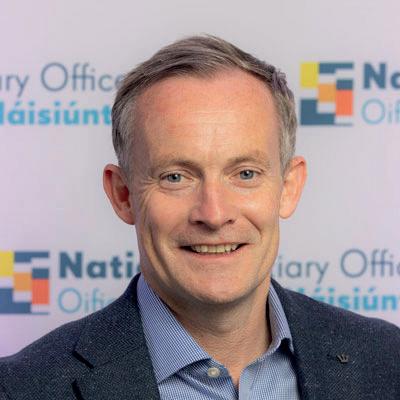

Dr Sarah O’Toole Tertiary Manager, TUS, Mid-West Tertiary Strategic Alliance
Jenny Whelan Tertiary Manager, Tipperary ETB, Mid-West Tertiary Strategic Alliance
Alan O’Gorman Tertiary Manager and FET Quality Manager, Waterford and Wexford ETB, South East and Midlands Strategic Alliance
Dr Sarah Sartori Higher Education


Three ways to thrive in the rapidly evolving tech field
Building the future together: inclusive pathways in construction
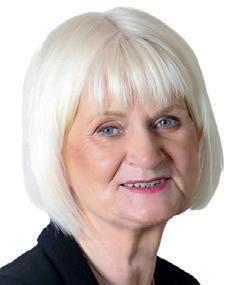
The playbook for a tech career has changed. It’s about skills, curiosity and community. Here’s how to build your future in this dynamic field.
I’ve had a front-row seat to the fast-changing nature of the technology industry, from the dot-com era to today’s AI boom. However, the transformation happening now is creating more opportunities than ever. The typical stereotype of a tech career — one limited to solitary, complex coding — is fading. If you’re looking to make your mark, here are three tips for building a future-proof career in tech.
1. Cultivate curiosity
My career journey has been a series of twists, turns and new opportunities, guided by a hunger for continuous learning and a willingness to take calculated risks. That’s why my core advice is to cultivate relentless curiosity and courage. With the pace of change today, especially with advancements in AI, your ability to constantly learn and adapt is far more important than any single skill you have right now. Being curious about how technology is changing our world isn’t just a passive trait; it’s essential to a successful career in this field.
2. Hone your skills
The world of work is moving away from hiring solely based on traditional degrees and is becoming
skills-based. Your unique abilities are now your most valuable assets. Instead of focusing only on a job title, think about building a portfolio of durable skills like creative thinking, problem-solving and data literacy. Viewing your career as a fluid combination of skills and tasks will allow you to stay agile and adaptable.
3. Build your connections and community In technology, building your professional network is essential. Seek out great mentors who will offer you honest guidance, and find sponsors who will actively advocate for you. I always encourage the young people I meet and mentor to engage with groups like Connecting Women in Technology (CWiT). These platforms provide invaluable knowledge, support and connections that can lead to incredible opportunities. Never underestimate the power of asking for a virtual coffee; it’s a simple way to build relationships that will support you for years to come.
Ireland’s construction industry is growing more inclusive, more innovative and more equipped for the challenges of tomorrow.
With initiatives like the Building Heroes social media campaign and the Careers in Construction Action Plan, driven by my Department, we are committed to ensuring that construction is a career option for everyone, regardless of background, gender or life stage.
Access to construction careers
The industry now offers numerous roles, from traditional craft apprenticeships to emerging careers in digital design, sustainability and modern methods of construction (MMC). Thanks to our expanding network of further education and training routes, access to these roles is more achievable than ever.
Our Building Heroes campaign has already reached millions online, particularly inspiring young people, notably women, to explore careers in construction. We’re not just building homes; we’re shaping communities, retrofitting for a greener future, designing smarter infrastructure and creating inclusive spaces to live and work.
Through powerful personal stories — like Giselle, a rising digital MMC trainee featured in the Building Heroes campaign — we are showing what’s possible in this evolving landscape.
Learning pathways for everyone
At the heart of our strategy is inclusivity. Our modular and flexible learning options allow people to enter the system in ways that fit their lives. Whether through microcredentials, online learning or apprenticeships, learners can progress at their own pace.
A standout example is our MMC Pathway Portfolio, developed in partnership with Laois Offaly Education and Training Board (LOETB). Through an accessible, modular framework reflecting how people live and work today, this initiative supports learners at all levels, including career changers and those returning to the workplace.
Looking ahead: equity in construction
As Minister for State in the Department, I have seen first-hand many of the exciting projects and programmes underway in the construction sector. As we update our Careers in Construction Action Plan, our focus remains firmly on breaking down barriers and advancing equity. We’re working across government and industry to ensure that learners from every part of the country, at every stage of life, can see the full picture of construction and see themselves playing a part in it.

Marian Harkin TD Minister of State for Further Education, Apprenticeship, Construction and Climate Skills
Clare Hickie Chief Technology Officer at Workday, Member of CWiT
Career advice that works: be curious, keep learning, follow your passion
Undergraduates now have a range of options open to them, from pursuing a master’s to applying for a graduate programme or diving straight into a particular industry.
Some of the best career advice I’ve received has been to follow my passions, continue to learn and remain curious. This three-part maxim has guided me throughout my early career. Upon graduating, I followed my passion by embarking on a career in publishing. However, after two years, I felt the need to change direction, so in 2021, I applied and was accepted to the IDA graduate programme.
Rotational graduate programme impact IDA Ireland is the inward investment promotion agency, responsible for job creation and economic development in Ireland. The graduate programme spans three years, with four nine-month rotations. During this time, graduates have the opportunity to work in one of eight regional offices, an overseas office, a support team and an operations team.
I began in the talent, transformation and innovation (TTI) team, supporting clients in future-proofing their operations in Ireland. After TTI, I worked in our HR&OD department where I contributed to various training and recruitment projects, including the recruitment of the 2022 intake of graduates — a real full circle moment. From there, I travelled to New York and had the opportunity to work on winning investments for Ireland. For my final rotation, I returned to Ireland to work in my home region, the Midlands.
Mission-driven career journey
There is a fantastic mission in what the agency does, and this was something I felt keenly in my Midlands role. Seeing investments won abroad translated into business in Ireland and employment for the community are things I never imagined when setting out in my career.
In 2024, I graduated again, this time from the IDA programme. I applied for a position in the policy department, and I now support colleagues in their engagements around energy and digital policy. IDA have been extremely supportive in this transition, and I have continued to learn and upskill through professional certificates in Digital Policy and Energy Economics.
I feel grateful to work for an organisation with a purposeful mission and to progress my career while doing so. If there is any advice I would give to graduates today, it is to follow your passion and always be curious to learn and grow. It’s not always possible to know exactly where you’ll end up, but if you follow your interests, you’ll enjoy the journey.

An Garda Síochána: why it’s a job worth doing
A new Garda Recruitment Competition is going live this September. Take your opportunity to embark on a career that provides varied work with unique demands, where you’ll make a real difference.
An Garda Síochána is a communityfocused organisation with a mission of ‘Keeping People Safe’ with a dual role and responsibility for the provision of policing services and protecting the security of the State.
Becoming a Garda
“For me, being a Garda means engaging with people, helping them, and making a tangible difference,” explains Garda Steven Carton. “Every hour is different, which is what drew me to the role.” To become a member of An Garda Síochána, Steven completed numerous pre-requisite assessments followed by training in Templemore and a two-year probationary period.
Rewarding moments on the job
One standout moment in Steven’s career reminded him of why he pursued this role and why he would recommend it. Describing it as just another day on the job, Steven recalls an incident where a husband and wife had gone kayaking, but the man had a stroke while they were on the water and slumped over: “I attended the scene and managed to get him out of the kayak and into an ambulance in time to make a full recovery. Moments like this remind me why this job matters, but it’s also small moments like helping an elderly lady who has lost her purse — those simple acts of assistance are incredibly rewarding.”
Career progression and training
Ongoing professional development is highly encouraged, and training does not stop after the probationary period is over, explains Steven. “Over the last 18 months, I have seen a real push in continuous learning and professional development, with new courses out all the time.”
He adds: “An Garda Síochána is looking for everyone, not just your typical broad male figure. Diversity is valued, and anyone with the right mindset can thrive. Active listening is key, whether it’s listening to the public, a colleague or your sergeant.”
Steven concludes: “You gain lifelong friends; your unit becomes family; and the role gives you structure and job security, which is especially important when you have two young children at home like me.”

Saffron O’Sullivan Policy Executive, IDA Ireland
Sponsored by An Garda Síochána
Return and thrive: turn a break into a new beginning
Deciding on a career path after a career break — whether for caring, health or relocation — is complex and can feel overwhelming.
Do you want to re-establish yourself in your previous career or pivot to something new? Should you look for a lower-stress local job or reignite your ambition? With so many options, it’s easy to get stuck. In psychology, we call this the ‘Paradox of Choice.’
Reflect, reset, move forward
This may well be the first time in years — perhaps even since leaving school — that you’ve had the space to reflect on what you truly want from your working life. It’s a perfect moment to step back, take stock and then move forward with renewed motivation and clarity about your next chapter.
Five tips to return with confidence
In my returner guidebook, ‘Return Journey: How to get back to work and thrive after a career break,’ I share a step-by-step roadmap for returning to work. Here are five top tips to help you move forward with confidence.
1. Clarify your motivations
Identify your ‘why’ – the reasons you’re returning. These are the areas where you don’t want to compromise.
2. Make job fulfilment your magnetic north
Rather than chasing happiness, searching for your passion or starting with flexibility, prioritise fulfilment. Look for roles that align with your strengths, values and interests, then consider how to make them work within your practical constraints.
3. Develop your decision criteria
Build your internal ‘career compass’ — a framework of ‘must-haves’ and ‘nice-tohaves.’ Consider your intuitive responses alongside a more analytical approach.
4. Test and learn
Once you’ve a shortlist of options, explore them actively before firing off job applications. Reality testing helps refine your direction.
5. Value your career break
Don’t let low confidence (experienced by 90% of returners) make you aim too low. Your maturity, fresh perspective, motivation and depth of experience are fantastic assets that set you apart.
View your return journey as not just about going back; it’s about moving forward purposefully, with a renewed sense of who you are and what you want from work.


Julianne Miles Co-Founder, Career Returners, Author: Return Journey
Garda Steven Carton
An Garda Síochána
See if An Garda Síochána is a fit for you:
Why gender balance is critical to the future of business success
Redefine diversity, equality and inclusion (DE&I) with balanced leadership, female-focused training and mentoring initiatives — proving that it strengthens workplaces, builds talent pipelines and drives long-term business success.

In today’s retail world, no brand — whether online or on the high street — can afford to overlook DE&I. People now expect representation and fairness at every level, from product ranges to workplace culture, and that demand is only growing stronger.
Employees choose businesses with diverse leadership
Naturally, that’s exactly as it should be says Elaine O’Brien, Chief Financial Officer at Woodie’s, the DIY home and garden retailer. So, lean into it. Celebrate it. For one thing, DE&I makes a business more productive and agile. “If your workforce isn’t diverse, you can’t achieve diversity of thought,” she points out. “You need insight from female voices.”
You might be surprised to hear that from a DIY retailer. After all, it’s tempting to stereotype these businesses as ‘male-dominated.’ This is not the case with Woodie’s, however, which has been certified as a Great Place to Work (GPTW) in Ireland and Europe and a Best Workplace for Women. Its employee base is gender-balanced, and its leadership team is 57% female.
“I would have no interest in working for a

business that didn’t have balanced leadership representation,” admits O’Brien. “Actually, I’d have no interest in working for a maledominated organisation, full stop. Because where would I fit into it?”
Empowering women with the right training
Here’s another bonus offered by diverse, inclusive and equality-driven workforces: they are attractive to everyone. “If we were a male-dominated retailer, we would alienate half of the population,” argues O’Brien. “We don’t believe that DIY, home and garden is the remit of men. We don’t believe it’s the remit of women, either. With the rise of the shared household and the majority of families with dual working parents, we believe it’s for all.”
Nevertheless, if a business wants to make certain that its approach to DE&I isn’t just a ‘tick box,’ it should implement initiatives and strategies that truly empower women in the workplace and promote gender equality.
For example, a key initiative at Woodie’s is its Seeds for Success programme, delivered in conjunction with Retail Ireland Skillnet. The programme allows colleagues to achieve a level

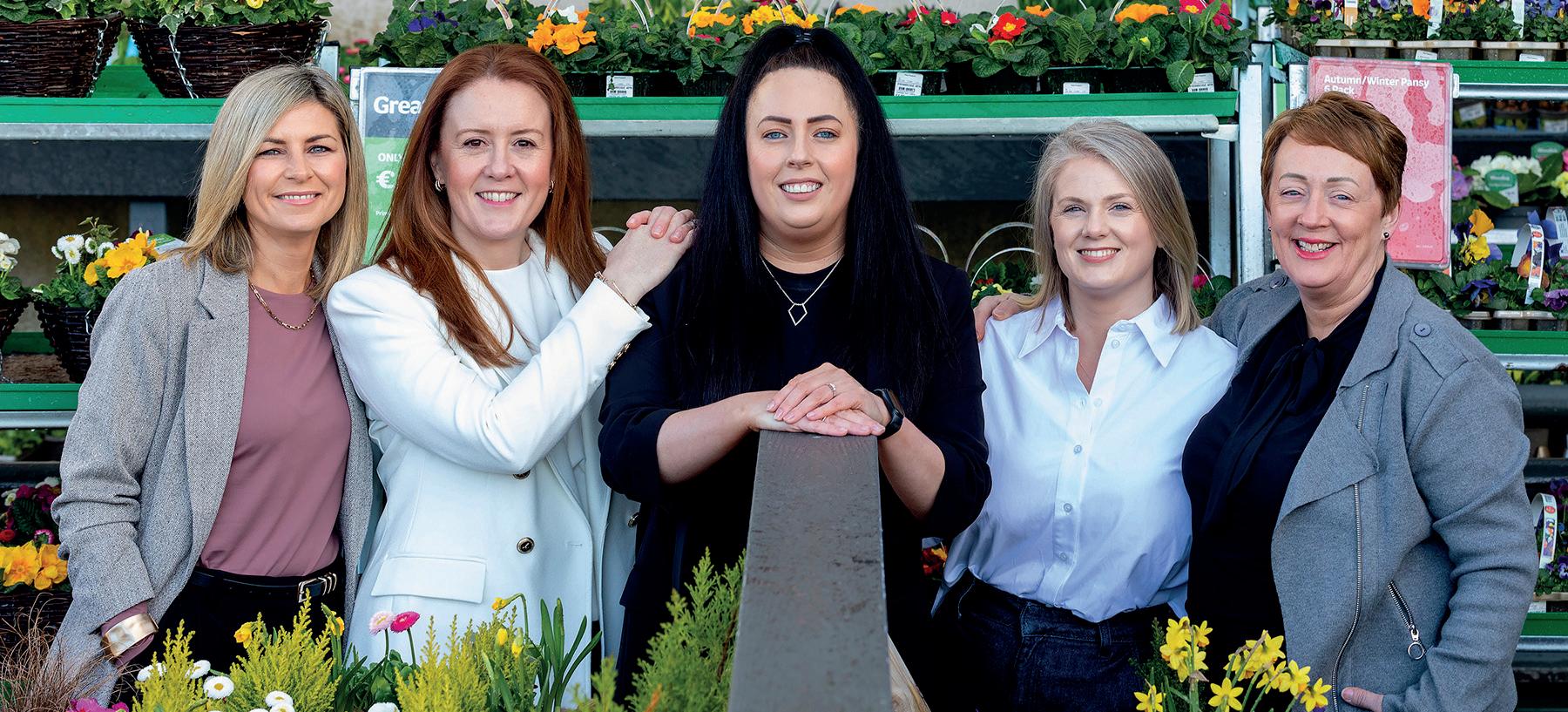
Elaine O’Brien Chief Financial Officer, Woodie’s
SPREAD WRITTEN BY Tony Greenway Image
Find out more at: woodies.ie
Sponsored by Woodie’s
Image provided by Woodie’s

6 qualification on the national framework. At last count, 54% of learners on the scheme were female.
When it comes to driving female representation at all levels, the company has developed an apprenticeship for colleagues who want to take the first step into management. Crucially, its cohort is always at least 50% female. That’s not just about doing the right thing by employees, says O’Brien. It also makes shrewd business sense.
“It’s important that we’re feeding our talent pipeline properly,” she adds. “If we empower women with the right training, they will be ready and able to move up the career ladder when senior roles become available.”
Importance of role models and mentorships
To give female leaders the opportunity to network outside of the company’s formal internal structures, Woodie’s has partnered with IMAGE Business Club, a space for Irish businesswomen to connect with and learn from each other. Plus, every year, a number of female colleagues from across the company are selected to attend Executive Women’s Gathering — Ireland’s largest bespoke summit for female business executives — to collaborate, network and listen to empowering stories by different female speakers.
“There’s a huge responsibility for female leaders to share stories of their career journeys and be open and transparent about the challenges they face,” reasons O’Brien. It’s also incumbent on companies to listen carefully to their people. That’s why Woodie’s has created a Shadow Board — made up of colleagues from across the organisation — to mirror the leadership team and keep them on their toes.
“The purpose of the Shadow Board is to disrupt and challenge the way the leadership team thinks and keep us connected to colleagues who are starting their career journeys,” says O’Brien. “As part of that, these individuals are each assigned a mentor from the leadership team. We work closely with them to support them, help them achieve their goals
and give them the confidence to be brave when it comes to their careers. Mentorship is a key driver of our diversity and equality agenda.”
Getting the buy-in of key decision-makers
The company also regularly reviews its family leave policies, so they are fit for purpose. “This in-cludes surrogacy, parental leave, paternity leave and adoption policies,” says O’Brien. “We want to know that we’re supporting all our colleagues in a way that’s fair and up-to-date.”
The potential of flexible working is also being considered by trialling a nine-day fortnight for interested staff.
For companies looking to roll out similar strategies, O’Brien insists: “We’ve done it successfully be-cause we’ve had the support of our CEO and the leadership team,” she says. “Bringing key decision-makers and stakeholders on the journey with you is very important. It’s also about empowering and educating male colleagues to get their buy-in, but take things a step at a time. You will get there.”
Realistic milestones for DE&I
O’Brien recommends that organisations keep milestones realistic and not overreach. “We’ve been good at that,” she says. “Because, at the end of the day, we’re a business and we have to make sure that we’re making the right business decisions. Yes, we want a genderbalanced workforce that is representative of the communities we’re serving, but we have to get there in a considered way and appoint the right individuals to the right positions. If you make personnel decisions simply to hit a KPI (key performance indicator), you undo the spirit of what you are trying to achieve.”
Both women welcome the day when DE&I is the default position for all businesses. “It will be great when DE&I is normalised and ‘par for the course’,” says O’Brien. “Not having to think of it as a KPI should be every company’s North Star.”
It is important to be surrounded by people who believe in you and who can support you, but more important is to believe in yourself, push yourself out of your comfort zone and have goals.
CASE STUDY: Ewelina’s Story
Store Manager Ewelina Witek-Murdzek reveals how she progressed her career with support from her managers — and by stepping outside her comfort zone.
Ewelina: Eighteen years ago, I graduated with a Masters in Horticulture and joined the Woodie’s team. I got married, became a mother and settled far away from home. I was passionate about plants and gardening, but I was also passionate about progression, improvement and pushing myself out of my comfort zone.
I was lucky enough to meet leaders in the company who recognised my strengths and believed in my capability, passion, positive attitude and desire for something greater for myself and others. I was given the opportunity to take a secondment as a Team Leader, and this was the first step in my management career.
Very quickly, I realised this was not the end of my career progression and that I was hungry for more. I moved to become Deputy Manager in our Bray store, County Wicklow, where I won Deputy Manager of the Year. A year later, I am very proud to say I became the Store Manager of Naas Road and currently the Store Manager of Sandyford in Dublin.
It is important to be surrounded by people who believe in you and who can support you, but more important is to believe in yourself, push yourself out of your comfort zone and have goals. I strongly believe it doesn’t matter where you are coming from, what gender you are or what stage you start at. What matters is the support you get, where you want to be — and how much you want it.
Image provided by Woodie’s
Why gender balance is imperative to driving innovation, inclusion and business success
Gender-balanced business leadership drives innovation and long-term success, but among other factors, caring responsibilities remain a key barrier to progression. Addressing this is essential for retaining and empowering top talent.

Gender balance fuels innovation
In all business and particularly in science, technology, engineering and maths (STEM), the most creative ideas and long-term solutions often come from teams that are diverse teams, not just in skills, but in gender. When teams include different perspectives, they tend to make better decisions, solve problems in new ways and create stronger outcomes. That said, in many organisations, especially at senior levels where important decisions are made, gender balance still hasn’t been achieved.
Care is a business issue
One key reason more women don’t reach senior leadership roles is the challenge of balancing work and care. Our recent report, ‘Breaking Glass Walls – A New Shape on Modern Organisations,’ shows us that care, whether it’s childcare, eldercare or self-care, is not just a personal concern; it’s a structural business issue that affects how organisations grow and succeed. The findings reveal that 37% of employees with caring responsibilities say this makes senior jobs feel out of reach. For women, that number rises to 41%.
To make real progress, companies need to support everyone who has caring responsibilities, regardless of gender or career stage. That means not just offering flexible working or parental leave, but making sure these supports are normalised, expected and encouraged for all employees. When care is shared, career progression can be too.
The future of sustainable business depends on inclusion
The conversation around gender equity in STEM is evolving — as it must. It’s no longer just about fairness; it’s about trust, accessibility and long-term success. Gender balance isn’t a nice-to-have; it’s a real advantage in a fast-changing world.
Businesses that support inclusion and care will keep their best talent, stay competitive and lead the way in STEM innovation. This is not about revisiting old challenges; it’s about enabling a future where all talent, at every level, is supported to succeed. The companies that act now won’t just adapt — they’ll lead.

Revealing what makes a workplace stand out to working
women
Organisations supporting employees through career and life stages stand out. Despite barriers, many in Ireland show it’s possible to build workplaces where women and all staff thrive.
Each year at Great Place to Work, we celebrate the Best Workplaces for Women™ — a recognition that celebrates organisations that are not only delivering for all employees but also standing out in their support for women. It’s an opportunity for us to recognise workplaces where fairness, flexibility and opportunity are more than words on a policy, but the lived reality of all employees. With it coming up on six months since the 2025 list was announced, it’s a timely moment to ask: what can we learn from these organisations, and how can others follow suit as we look ahead to 2026?
What sets these workplaces apart?
Organisations recognised this year share a commitment to building cultures where women feel supported, valued and empowered to grow. Among the women surveyed in these workplaces, including the lived experience of over 2,200 female leaders, 91% say they feel treated fairly regardless of gender — a powerful signal that these cultures are working. Yet, fairness is just the starting point. These workplaces also focus on leadership development and creating flexible environments where women can thrive across all stages of life and career, with 88% of women in these organisations also agreeing that they feel able to take time off work when they think it is necessary. It’s this long-term, people-centred approach that
helps them perform better, retain talent and adapt to changing workforce needs.
Lived experiences and driving change
Through this year’s Best Workplaces for Women™ report, we featured exclusive interviews recounting the lived experience of employees at these organisations, gaining key insights from all types of industries — from hospitality groups to insurance advisors. We heard from the Group HR Director at the O’Donoghue Ring Collection, who praised how inspiring it is “to work in an environment where gender bias doesn’t exist and where women are actively encouraged to grow and thrive across all departments and career paths.”
Further comments from Sales Director at Global, Ireland’s leading outdoor advertising agency, stated how their organisation’s dedication “is not a gimmick — the company lives and breathes its values of trust, fairness and transparency.” This type of organic endorsement is exactly what sets these organisations apart and showcases the true commitment to enabling women to thrive.

Elizabeth Sheehan Country Executive, 30% Club Ireland
Fania Stoney Business Development Strategist, Great Place to Work
What every employee needs to know about digital skills in 2025
Learn why digital upskilling in areas like AI, cybersecurity and data analysis is vital even for non-IT workers — and how Ireland is helping bridge today’s urgent tech skills gap.

The World Economic Forum emphasises the importance of upskilling in the workplace with critical skills such as cloud computing, cybersecurity, data analysis and software development. The accelerated adoption of digital tools, remote work solutions and advanced technologies like machine learning and generative AI means that to navigate rapid technological change, we do need to continuously develop these critical skills. What does this mean for workers?
Exploring digital skills in the workplace
In 2023, a study commissioned by IDA Ireland and Skillnet Ireland highlighted the need to upskill non-IT employees with key digital and data skills. The study identified data analysis as a significant skill gap among non-IT employees, with 49% of respondents highlighting this need.
meaning from data, as well as have the digital proficiency to work with technology and improve efficiency.
Developing digital skills today
IDA Ireland offers a range of supports to help clients develop digital skills. One of the key initiatives is the IDA Ireland Innovation Diagnostic and Training Supports, which includes a diagnostic process to identify skills gaps in a business and match them with appropriate supports. The basic digital skills needed for non-IT roles that emerged from the report are available, along with an assessment process. There is a range of excellent programmes, both online and in person, to help with skills development. These can be accessed through the local Regional Skills Forum Manager.
The study identified data analysis as a significant skill gap among non-IT employees.
Other skills such as digital literacy, AI and data analytics, cybersecurity, privacy and data/information management were also identified as key. Additionally, the study emphasised the importance of improving data literacy across the board.
All workers should be able to interpret, use and create
How to make upskilling work for people,
places and productivity
The success of green, digital and demographic transitions depends not just on technology or goals, but on people and the places they live and work.
Recent OECD work shows that the places most at risk of job displacement due to automation or industrial change are often those least equipped to respond. This regional imbalance is not new, but it is becoming more urgent.
In some OECD regions, over 25% of jobs are at high risk of automation, while others face a surge in demand for green and digital skills, with insufficient training provision in place. Without targeted investment, these transitions could deepen divides. However, with the right policies, they offer a historic opportunity to boost both equity and productivity.
Future skills are technology-driven
We all need to think about how we improve our tech skills and take advantage of the numerous programmes of upskilling programmes available. As Copilot becomes our best friend and helps us become more efficient, just learning how to engage with technology might give us back some precious time.
Place-based skills strategies are essential
Local labour markets vary dramatically in their structure, vulnerabilities and capacity to adapt. Yet, training policies are often designed at the national level. This mismatch weakens their impact.
The OECD’s Job Creation and Local Economic Development report highlights the growing need for place-sensitive upskilling and reskilling programmes. Regions facing industrial decline need tailored support to shift workers into new, sustainable industries. This means aligning training with local assets, from green manufacturing to rural health care to digital services.
France’s Plan d’Investissements dans les Compétences (PIC) channels EUR 15 billion into training low-skilled youth and the long-term unemployed. Half of this supports regional programmes tailored to local labour needs, with public-private partnerships supporting green transition roles.
Early action reduces long-term costs
Industrial transitions take time, but delays are costly. OECD analysis shows that when training lags labour-market needs, regions risk long-term stagnation and skills shortages. By 2042, 72% of OECD regions could face tighter labour markets
due to demographic shifts, underlining the urgency of early investment in vocational education and digital access.
Canada’s Future Skills Centre offers both national and regional programmes focused on digital skills, AI and the green transition. Its emphasis on early action and local tailoring offers a model for others.
From recovery to resilience
Delivering effective training requires coordination across governments, employers and education providers. Local skills councils, employer-led hubs and flexible funding models work best when regions have the capacity to act.
Upskilling isn’t a silver bullet, but it’s one of the few tools that can boost productivity, reduce inequality and support the green transition — if rooted in place and embedded in wider regional



Breda O’Toole Head of Talent Development & Digitalisation, IDA Ireland
Lukas KleineRueschkamp Head of Unit - Local Employment and Skills, OECD
Patricia Peñalosa Policy AnalystRegional Labour Policy, OECD
How a job search platform is supporting career development across Europe
If you want to work or study in Europe, it can be a challenge to find roles or courses in unfamiliar countries. However, an online platform is available to make the process easier.

The freedom to work or study in different countries in Europe can broaden your mind, hone your skills and help you grow both professionally and personally
Access and adaptability across borders

“I’ve lived in a few different countries,” says Naomi Oldenburg, Senior Manager at Quality and Qualifications Ireland (QQI), the state agency which hosts the Irish National Europass Centre. “I’ve always found it exciting to learn about other cultures and experience something different. Apart from hard skills, living abroad also teaches adaptability, flexibility, resilience and independence — important soft skills which are useful throughout your career.”
Of course, before you can work or study in Europe, there’s a big hurdle to overcome. Namely, how do you start to find the jobs or learning opportunities it offers, especially if you’re not familiar with a particular country, its customs or its language?
features learning opportunities in 14 countries. It now has more than 8 million registered users and, in 2024, recorded 16.4 million unique visitors.
After users have created their free account, they build a profile of their career experiences, qualifications, languages, skills and hobbies. They can then make use of a standardised CV — in a format widely recognised across Europe — and cover letter. Plus, they can compare their own qualification levels with qualifications from other European nations.
Tools to empower people in career development
Sponsored by
By centralising the search process, the site makes it easier to find roles in all kinds of occupations and also features learning opportunities in 14 countries.
Say you’re an administrator from Galway who wants to look for work in Greece, or you’re a graduate from Mayo who wants to study a Master’s degree in Malta. Where do you begin? You could trawl through a range of different job or education websites in those countries, but that would be time-consuming and confusing.
There are other challenges, too. How can you properly showcase your skills and qualifications to potential employers abroad? How do you know if your Irish qualifications will measure up to, say, German qualification standards?
Making it easier to find roles and learning opportunities


“We’ve also introduced a new interview preparation tool,” explains Alice Long, Senior Executive Officer, QQI. “This provides candidates with a preparation checklist in advance of their interview and gives suggestions on what to do on the day of the interview. It helps them prepare answers to common interview questions and build up their own bank of questions.”
Users can also organise their personal information by securely storing digital credentials and certificates in their own unique libraries, as well as track and organise job applications.
“Having all your credentials in order — and in one place — makes it easy to apply when you find the job you want,” says Oldenburg. “It’s all about enhancing mobility and empowering people to develop their careers.”
Understanding this challenge is why the EU launched Europass 20 years ago. This is a free, multilingual and secure online platform which offers tools, resources and information to support anyone interested in working and learning across Europe (the National Europass Centre coordinates its activities in Ireland). By centralising the search process, the site makes it easier to find roles in all kinds of occupations and also

Naomi Oldenburg Irish National Europass Centre, Quality and Qualifications Ireland
Alice Long Irish National Europass Centre, Quality and Qualifications Ireland
WRITTEN BY Tony Greenway
